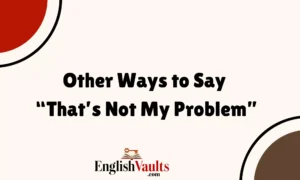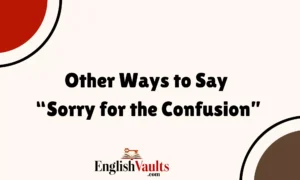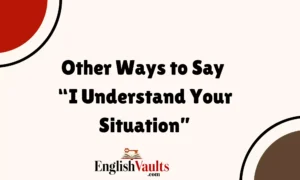In today’s fast-paced world, effective communication is essential. Whether in professional settings or casual conversations, you may find yourself needing to give someone a friendly reminder or alert about an important matter.
While “just a heads up” is a common phrase, it’s beneficial to have a variety of expressions at your disposal. Here are 20 alternative ways to say “just a heads up,” complete with scenarios to illustrate their use.
List of Other Ways to Say “Just a Heads Up”
- Just a Quick Note
- Just So You Know
- I Wanted to Make You Aware
- Just a Reminder
- For Your Information
- Heads Up
- I Thought You Should Know
- Just a Small Update
- Keep in Mind
- I’d Like to Bring to Your Attention
- Be Aware That
- Just Thought You Might Want to Know
- Wanted to Keep You Updated
- Take Note That
- I’d Like to Flag This for You
- Please Be Informed
- Just a Little Reminder
- A Quick Heads-Up
- Just to Let You Know
- I Want to Ensure You’re Aware
- Don’t Forget About
- A Friendly Reminder
- Just a Quick Update
- I Want to Keep You in the Loop
- Make Sure You’re Aware
1. Just a Quick Note
Scenario:
Subject: Quick Note About Tomorrow’s Meeting
Hi Leo,
I wanted to send you a quick note that tomorrow’s meeting will start at 10 AM instead of 11 AM. Please let me know if you have any conflicts with this new time.
Thanks, Henry
Addition:
Using “just a quick note” is a simple yet effective way to convey your message. It signals to the recipient that the information is important but doesn’t require extensive explanation.
2. Just So You Know
Scenario:
Subject: Upcoming Changes to the Project Timeline
Hi Leo,
Just so you know, we have decided to extend the project deadline by two weeks. This should give everyone a bit more time to finalize their tasks.
Best, Henry
Addition:
“Just so you know” can be used when sharing updates that are crucial but not urgent. It helps in maintaining an open line of communication.
3. I Wanted to Make You Aware
Scenario:
Subject: Important Update on the Budget
Hi Leo,
I wanted to make you aware that there will be a budget review next week. Please prepare any relevant documents you might need.
Regards, Henry
Addition:
This phrase conveys a sense of responsibility and consideration. It implies that the speaker values the recipient’s awareness of the matter.
4. Just a Reminder
Scenario:
Subject: Reminder About the Client Presentation
Hi Leo,
Just a reminder that we have the client presentation scheduled for Friday at 2 PM. Let me know if you need any help with your slides!
Cheers, Henry
Addition:
Using “just a reminder” is effective for reiterating previously discussed information, reinforcing its importance without being overbearing.
5. For Your Information
Scenario:
Subject: For Your Information: New Office Policies
Hi Leo,
For your information, the HR department has implemented some new policies regarding remote work. You might want to take a look at them when you get a chance.
Best, Henry
Addition:
This phrase is particularly useful in professional settings where formal communication is required. It implies a sense of transparency.
6. Heads Up
Scenario:
Subject: Heads Up About Traffic Issues
Hi Leo,
Just a heads up that there’s construction on the main road to the office. You might want to leave a bit earlier to avoid any delays.
Thanks, Henry
Addition:
“Heads up” is an informal way to alert someone. It’s direct and implies that the information is time-sensitive.
7. I Thought You Should Know
Scenario:
Subject: I Thought You Should Know About the Changes
Hi Leo,
I thought you should know that the deadline for submissions has been moved to next Thursday. Please adjust your plans accordingly.
Best, Henry
Addition:
This expression carries an element of consideration, showing that you care about the recipient’s ability to act on the information.
8. Just a Small Update
Scenario:
Subject: Just a Small Update on the Project
Hi Leo,
I wanted to give you just a small update—the project is progressing well, but we hit a minor snag with one of the suppliers. I’ll keep you posted.
Regards, Henry
Addition:
“Just a small update” softens the message and suggests that while the information is important, it’s not a major issue.
9. Keep in Mind
Scenario:
Subject: Keep in Mind for the Team Meeting
Hi Leo,
Please keep in mind that we will be discussing the quarterly goals at our team meeting next week. It would be great if you could prepare some insights.
Thanks, Henry
Addition:
Using “keep in mind” encourages the recipient to consider the information for future discussions, making it proactive.
10. I’d Like to Bring to Your Attention
Scenario:
Subject: I’d Like to Bring to Your Attention Some Feedback
Hi Leo,
I’d like to bring to your attention the feedback we received from the last client meeting. We must address their concerns promptly.
Best, Henry
Addition:
This phrase adds a level of formality and emphasizes the importance of the information being shared.
11. Be Aware That
Scenario:
Subject: Be Aware That Some Changes Are Coming
Hi Leo,
Please be aware that there are some changes coming to the project scope. We’ll discuss this further in our next meeting.
Regards, Henry
Addition:
“Be aware that” is straightforward and demands attention, signaling that the information could impact the recipient’s work.
12. Just Thought You Might Want to Know
Scenario:
Subject: Just Thought You Might Want to Know About the Event
Hi Leo,
I just thought you might want to know that there’s a networking event next Thursday evening. It could be a great opportunity for you to connect with others in the industry.
Cheers, Henry
Addition:
This phrase feels personal and conversational, making it suitable for both professional and casual contexts.
13. Wanted to Keep You Updated
Scenario:
Subject: Wanted to Keep You Updated on the Client’s Feedback
Hi Leo,
I wanted to keep you updated on the client’s feedback regarding our last proposal. They were mostly positive but had some suggestions for improvement.
Thanks, Henry
Addition:
Using “wanted to keep you updated” indicates that you are invested in the recipient’s awareness and involvement.
14. Take Note That
Scenario:
Subject: Take Note That the Deadline Is Approaching
Hi Leo,
Take note that the deadline for the project submissions is next Friday. Make sure everything is on track.
Best, Henry
Addition:
“Take note that” conveys urgency and importance, making it clear that the recipient needs to pay special attention.
15. I’d Like to Flag This for You
Scenario:
Subject: I’d Like to Flag This for You
Hi Leo,
I’d like to flag this for you—the budget cuts might affect our upcoming initiatives. Let’s discuss this in our next team meeting.
Best, Henry
Addition:
This phrase implies importance and often conveys that the information may require further action or discussion.
16. Please Be Informed
Scenario:
Subject: Please Be Informed About the Policy Update
Hi Leo,
Please be informed that the company will be reviewing its remote work policy next month. It’s advisable to stay updated on any changes.
Regards, Henry
Addition:
“Please be informed” sounds formal and authoritative, making it suitable for official communications.
17. Just a Little Reminder
Scenario:
Subject: Just a Little Reminder About the Team Outing
Hi Leo,
Just a little reminder that our team outing is scheduled for Saturday at 4 PM. Hope to see you there!
Cheers, Henry
Addition:
This phrase is friendly and approachable, making it great for less formal situations while still emphasizing the importance of the reminder.
18. A Quick Heads-Up
Scenario:
Subject: A Quick Heads-Up About the Status Report
Hi Leo,
Here’s a quick heads-up that the status report is due this Friday. If you have any questions, feel free to reach out.
Thanks, Henry
Addition:
Using “a quick heads-up” is a friendly way to provide a reminder, making it clear that the information is pertinent.
19. Just to Let You Know
Scenario:
Subject: Just to Let You Know About the New Office Hours
Hi Leo,
Just to let you know, the office hours will be adjusted to 9 AM to 5 PM starting next week.
Best, Henry
Addition:
This phrase is simple and effective for conveying important updates in both casual and formal contexts.
20. I Want to Ensure You’re Aware
Scenario:
Subject: I Want to Ensure You’re Aware of the Upcoming Changes
Hi Leo,
I want to ensure you’re aware of the upcoming changes in our project timeline. We must adapt our strategies accordingly.
Thanks, Henry
Addition:
This phrase shows a proactive approach to communication and emphasizes the importance of awareness for the recipient.
Conclusion
Having a variety of expressions to convey “just a heads up” can enhance your communication skills and make your messages more engaging. Whether in a professional environment or personal conversations, these alternatives can help you effectively share important information. By tailoring your language to suit the context and your relationship with the recipient, you can ensure that your messages are well-received and understood. Use these alternatives to make your communication more dynamic and effective!










